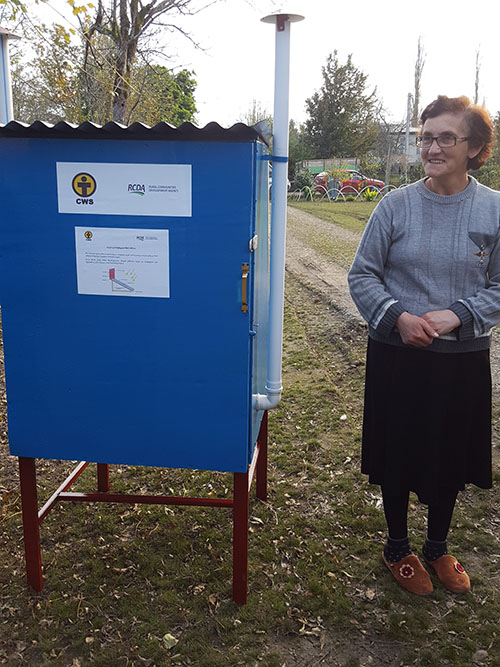Stories of Change

Marina Cirdava stands near the family's solar fruit dryer. Photo: Steve Weaver / CWS
CWS works with 550 families across Georgia to adopt the use of Renewable Energy Technologies.
Source: Renewable energy technologies: a win-win in Georgia
Lifting the heavy energy burden in Georgia
Conventional wisdom in the United States is that you shouldn’t pay more than about a third of your income on rent. For rural families in the nation of Georgia, it isn’t rent that is using up a third of income. It’s energy.
For these families trying to cover basic needs with meager incomes, paying for electricity and firewood is a heavy burden.
It’s not only a tough situation for families’ finances. It’s also hard on the environment. According to the head of CWS’s partner Agency, Rural Community Development Agency, wood is being extracted from Georgia’s forests at four times the sustainable rate. Deforestation is leading to landslides, erosion and a release of carbon dioxide, exacerbating climate change.
In the face of these challenges, CWS and RCDA are partnering with families like the Cirdavas in the village of Khoorga in the Khobi municipality of western Georgia to increase the use of renewable energy technologies in households. Three generations of the Cirdava family live together, including grandparents Marina and Malxazi, parents Zalina and Alika and children Tamuna, Tiniko and Saba.
The Cirdavas are a model family. Literally. They have worked with CWS and RCDA to install a series of renewable energy technologies into their house, which serves as a model for their community. These technologies include:
– A fuel efficient stove: The family was spending about $240 each year on firewood. (Keep in mind that in Georgia, the average household income is only about $3,000 annually.) According to Zalina, the new stove uses only 1/6 of the firewood as the old one, meaning that the cost for firewood has dropped to $40 annually. The stove provides a heat source for the home and has a compartment for baking bread, which, as our staff found out, is delicious.
– A solar collector for hot water: The family used to use an electric hot water heater, which they no longer have a need for. That means that the solar collector is saving the five percent of household income that was previously spent on electricity for the electric heater.
– A solar fruit dryer: This provides a new income stream for the family, who can dry large amounts of fruit and vegetables gathered from their farm and then sell them.
– A briquette making device: This makes briquettes from farm bio-mass waste. The briquettes can then be used in place of firewood in the wood stove, further reducing the family’s expenses and environmental footprint.
– An eco toilet: Eco composting toilets return human waste as fertilizer that can be used on the farm.
All of these technologies have a place in the home and are in use, but Zalina says her favorites are the stove and hot water solar collector. Like all technologies in this program, the pieces in the Cirdava home were made by local crafts people using locally sourced materials.
One objective of the CWS Renewable Energy Technologies program is to profile these technologies for wider adoption and use. The Cirdavas tell us that friends and neighbors have expressed interest in having these technologies in their own homes. Wide scale adoption of these technologies will lessen the pressure on forests, reduce use of conventional energy, provide valuable savings and generate new income streams for rural families and will build new industries of renewable energy technologies.
